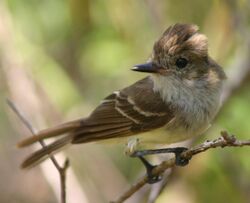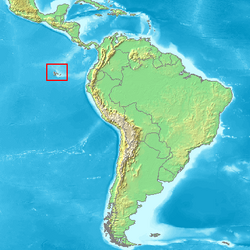Biology:Galapagos flycatcher
| Galápagos flycatcher[1] | |
|---|---|

| |
| Male on Santiago Island | |
| Scientific classification | |
| Domain: | Eukaryota |
| Kingdom: | Animalia |
| Phylum: | Chordata |
| Class: | Aves |
| Order: | Passeriformes |
| Family: | Tyrannidae |
| Genus: | Myiarchus |
| Species: | M. magnirostris
|
| Binomial name | |
| Myiarchus magnirostris (Gould, 1838)
| |

| |
The Galápagos flycatcher (Myiarchus magnirostris) also known as the large-billed flycatcher is a species of bird in the family Tyrannidae. It is endemic to the Galápagos Islands, where it is present on all the main islands. Its local name is 'Papamoscas'. The species was once placed in its own genus, Eribates, based upon a supposed "very long tarsus".
The Galápagos flycatcher is 15 to 16 cm (5.9–6.3 in) in length and weighs 12 - 18.5 grams. It is the smallest member of its genus.
Its natural habitats are tropical dry forests and tropical arid shrubland with cacti.
The Galápagos flycatcher has become used to human visitors to the Galápagos Islands and flies towards large camera lenses, perceiving its own reflected image as another bird. It habitually perches on visitors and their cameras.
Gallery
References
- ↑ Gill, F., Wright, M. & Donsker, D. (2009). IOC World Bird Names (version 2.2). Available at http://www.worldbirdnames.org/ Accessed 30 August 2009
- ↑ BirdLife International (2016). "Myiarchus magnirostris". IUCN Red List of Threatened Species 2016: e.T22700442A93776627. doi:10.2305/IUCN.UK.2016-3.RLTS.T22700442A93776627.en. https://www.iucnredlist.org/species/22700442/93776627. Retrieved 12 November 2021.
Wikidata ☰ Q943387 entry
 |




